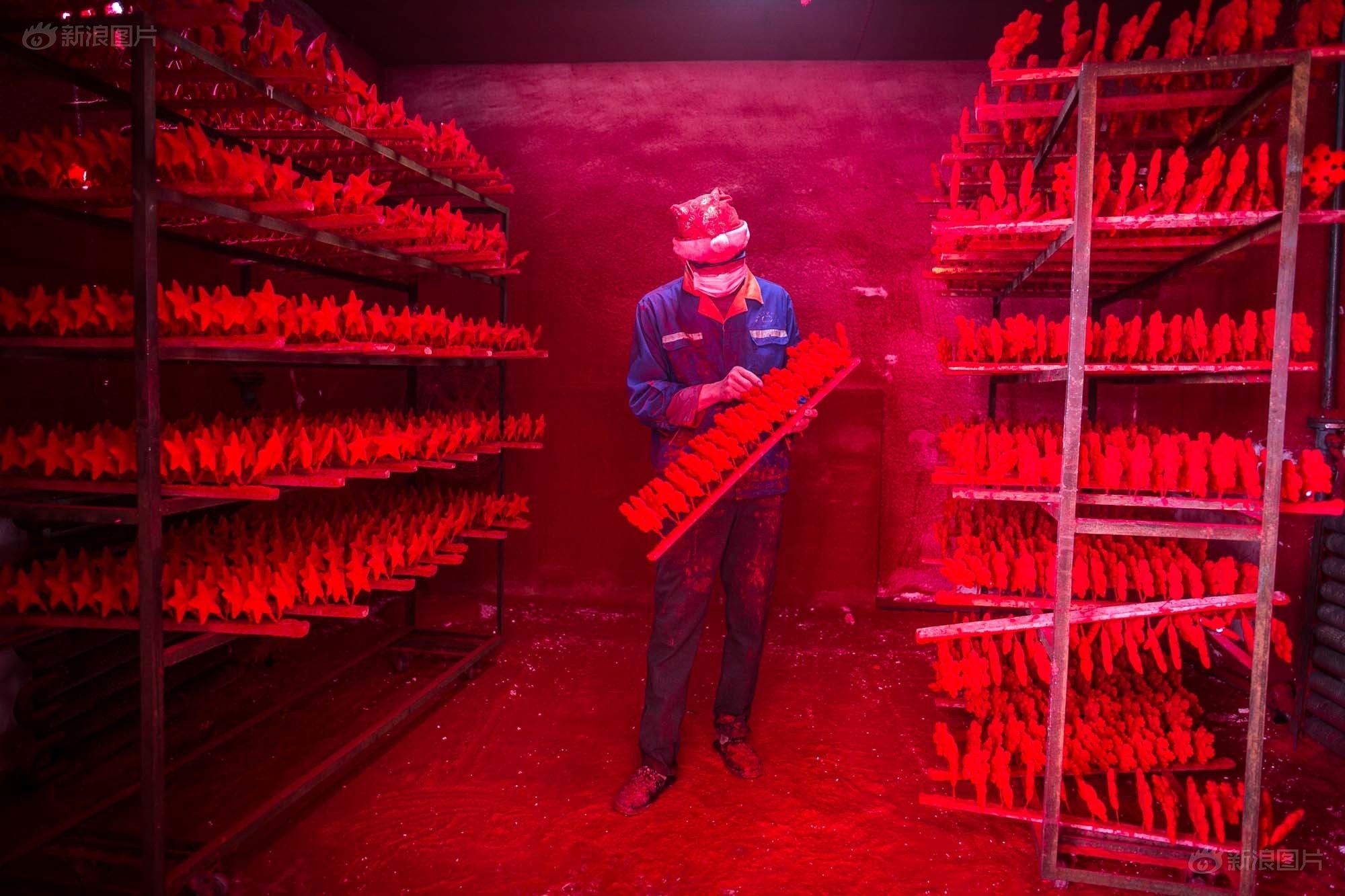"What does this mean?" asked Casper Clausen, lead singer of Denmark's cinematic indie ensemble Efterklang at Beijing's Yugong Yishan last Friday.
Be prepared - they'll be playing Shanghai on Tuesday as part of the Modern Sky Festival, and probably ask you guys the same question about a short recorded sample - a disembodied choir singing something strangely familiar.
Clausen explained it is a large group of elderly people singing at the Temple of Heaven they had recorded during their first visit back in 2008, used in their breakthrough album Magic Chairs, and still has no idea what they are singing.
Neither did the crowd. "So they're singing nonsense?" asked Clausen, smiling. "I love old people."
The band returns to China on an extended tour for their latest release Piramida, named for its similarly made field recordings from Pyramiden, an abandoned Russian-mining town located on the remote Norwegian island of Spitsbergen, well above the Arctic Circle.
However, the sextet deemphasized distance during their 90 minute set with gifts for Beijing from fans at their previous show in Seoul (which included a Lego police officer and a letter to Lillian - who was in attendance - from Keiko, telling her to "find a boyfriend fast.")
But no gift was better than opening and closing the show with their surprise guest, Hugjiltu, the horse-head fiddlemeister from Mongolian music project Ajinai, who improvised while singing deep Khoomei (throat singing) with Clausen and the angelic vocals of bandmate Katinka Fogh Vindelev.
Clausen (CC) and Hugjiltu (H) talked briefly after the show about how their chance meetup in Beijing was weirdly foreshadowed outside Copenhagen.
UPDATE: Tell Efterklang the song they sampled is the last line from the revolutionary song, "Crossing the Snowy Mountains and Grassy Marshlands", from the collection Songs of the Long March. It's the last line in the song, which goes, “The ideals of the revolution are higher than the heavens." (click here for a clip).

That's: You talked about sampling something during your first time in China back in 2008 that made it into the song "Full Moon" on Magic Chairs (2010). Can you talk about that?
CC: Yeah, we went to the Temple of Heaven early in the morning, watching old people practicing Tai Chi, playing this ball game I still don't know what its called and jamming on fiddles. And in the middle of the park, you had between two and three hundred old people standing around a digital piano, and there was this one old guy conducting a choir of what I guess were old folk songs. But for us we were seeing it from a far away place, thinking 'what is that sound? Let's record this.' Later on I dumped it into the rotation in my iTunes and would just listen to it. Then one day I was working on a new song, not really sure what I wanted to do with it, and suddenly the sample came on again (hums the tune). It made the song sound completely different. The chanting just worked.
That's: Did you record anything this time in China?
CC: Well, we forgot our nice recording equipment this time, so all we've got are iPhones. But we recorded this guy (points to Hugjiltu) yesterday in a bar.
That's: How did that happen?
CC: Our friend Ed took us to a bar [Amilal] last night. It was cozy, there was whiskey, and we saw this weird-shaped instrument case standing in the corner. We were like, 'What is this thing?' Then the owner started explaining what a horse-head fiddle was and how to play it, and we tried to make sounds on it. Later on Martyn (Heyne, guitarist) started telling him we saw a band playing this instrument at the Roskilde Festival this year that blew us away. Then he said, 'Was it Dawanggang?' YES! (Hugjiltu toured Denmark with Dawanggang this year). We couldn't believe that the instrument of the only Chinese band we know or had ever seen was fucking standing there, the exact one he played. Then phone calls are made, one thing leads to another and [Hugjiltu] shows up at the bar. He comes in, plays three songs and we were like 'what was that'?
That's: So did Efterklang ask you to play with them after that?
H: Yeah, we just decided to try and improvise without practicing or anything. After playing for them we listened to their song ["Black Summer"] so I could get a feel for their style.
That's: That song is rhythmically quite difficult. What did you think that style was?
H: Their music isn't really built around difficult technique, but very simple elements stacked together. This leaves a lot of space for improvisation. Plus they really got into it, and when people get into the music they're playing, so do I.
CC: For me, it's the same way. I see it as very simple, because we're really simple musicians. We're very different from someone like [Hugjiltu].
H: I'm not saying technique is the most important thing. Because in authentic Mongolian music, many of the most respected artists are not great technicians. They play with feeling. A feeling from just living. To me [Efterklang] does the same. They use a modern approach to understanding these things. And simple elements are often the hardest to pull off. You need to play with feeling or it doesn't work. That's the best compliment I can say about any music.
CC: We make music to reach people with good ears, for those who are really listening. And when we do that, it's a wonderful feeling. Sometimes we're asked, who would you really like to work with, like David Bowie, Bono or Madonna, stuff like that - I never have an answer for that. But you know, the best is meeting and playing with people like you [Hugjiltu]. It's a cooperation that gives me something.
H: That's what real musicians think.
CC: Yeah, because the more I play music over the years, the more I realize its about meeting and collaboration.
H: Collaboration is the most important part of music. If you don't get together, you'll never absorb any new information that can change you. You might as well just sit at home, play, and not getting anything back. You'll never grow.
That's: (to Hugjiltu) Speaking of new information, what was your Denmark experience like?
H: Well, I have done three tours there with Dawanggang and Ajinai, where we play four shows each time. We've got some street teams made up of fans there who help promote our shows. And each time, the shows got bigger. Plus I love the summertime. The sun puts everyone in a good mood. Because here, the pace is so fast, and everyone's so tired.
CC: Yeah, I could definitely feel that. There's a lot of movement here. There's so much I don't understand, that pace is different and the rhythms are behind something I can't quite see or feel. But you know, I get Hugjiltu. I feel like I understand his rhythms. Pace of life, conversation and music are similar things and they affect each other so much.
That's: (to Casper) That's something you explored in Piramida (2012), going to a far away place.
That pace was so different it was so different than I had ever tried before. It was such a silence that I had never experienced. I really feel that place is so important. We get asked if our music was inspired by our country or landscape all the time, especially after Piramida. But when I talk to Hugjiltu, it's very obvious he is influenced by his place of birth and he knows where his musical roots are. For me, it's different. Place infects you, but often you don't really know how. It's only when you go to a place like Piramida that you can hear and feel an immediate connection to place in your music.
That's: (to Hugjiltu) How do you think a place like Denmark would affect your music?
H: I don't think it would be a good idea.
That's: Why?
H: There's no pressure. I would probably record things half way then think, 'it's comfortable here. I'm going to go drink a beer and relax in the sun.' I'd be afraid of that, because in Beijing, that would be impossible. I'm always anxious to get this job done, because so many people are attached to the project that you've got to do your part. I'd probably go record there when I'm 50 (laughs).
CC: I see that. I get that a lot from American bands and musicians also. They're all super driven to record, finish and go bigger. But if you come to visit our studio, you'll see the way we work with this kind of music is so different. We'll work on something, record, listen, then I'll go home and sleep a bit. The next day, we'll come back, add a little bit more, listen again. It's a completely different pace.
H: I think that's part of the environment. In Europe, there's a different attitude towards the arts. There is more support for artists, from fans and even government. But for every album we do, we've got to scrimp money, run into the studio and get it all down, fast. It has to be about getting things done.
That's: (to Casper) You recorded in a place almost devoid of humans. What do you think your music would sound like if it was written in the most crowded place on earth?
CC: Ha, that's an interesting challenge.What would all that human activity do to us? We'll have to try it someday.
//RMB120, RMB100 presale, December 3, 9pm. Triple Smash support as part of the Modern Sky Festival. On Stage, 570 Huaihai Xi Lu, Red Town, A2-101, 淮海西路570号红坊 A2-101 (6212 6991).





















0 User Comments